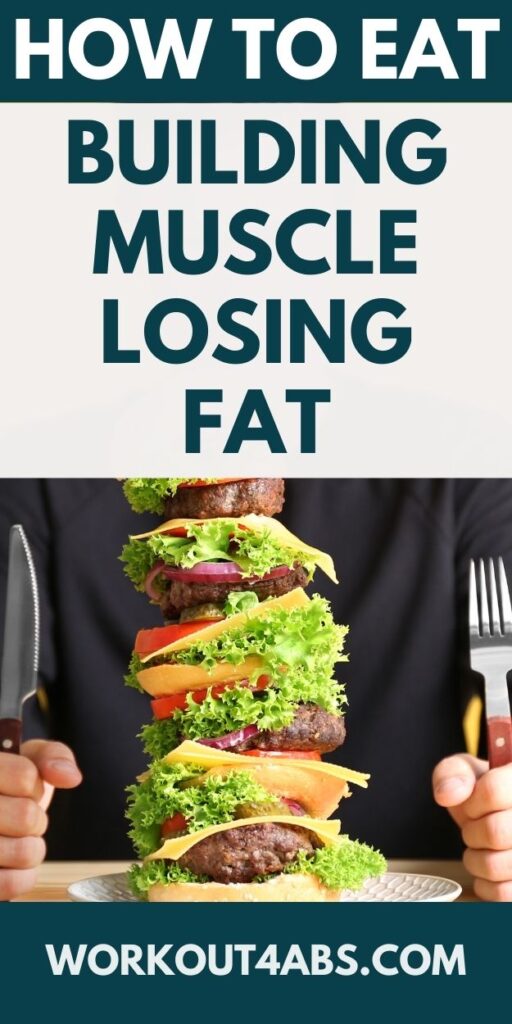Bodybuilding meal plans for building muscle while simultaneously shedding body fat. This article delves into the intricacies of nutrition, offering valuable insights on how to eat strategically to maximize muscle growth and fat loss, paving the way for a leaner, stronger you.
How To Eat To Build Muscle & Lose Fat (Lean Bulking Full Day Of Eating)
If you enjoyed these tips, please save this pin to your Pinterest Board.

Aim for Too High of Protein
When the goal is body recomposition, which involves reducing body fat while preserving or building lean muscle mass, it’s generally better to err on the side of consuming too much protein rather than too little. Here’s why a higher protein intake is advantageous for recomposition:
- Preservation of Lean Muscle Mass: Protein is essential for maintaining and repairing muscle tissue. A higher protein intake helps ensure that your body has an ample supply of amino acids, which are the building blocks of muscle. When in a calorie deficit (common for fat loss during recomposition), your body may break down muscle tissue for energy if protein intake is insufficient. A higher protein intake can help prevent this muscle loss and promote muscle preservation or even growth.
- Increased Thermic Effect of Food (TEF): Protein has a higher thermic effect of food compared to fats and carbohydrates. This means that your body expends more energy (calories) digesting and processing protein. A higher protein intake can slightly boost your metabolic rate, aiding in calorie expenditure and potentially supporting fat loss.
- Appetite Control: Protein is known for its satiating effect. It helps you feel full and satisfied after meals, which can assist in controlling calorie intake. When you’re consuming enough protein, you’re less likely to overeat, making it easier to maintain a calorie deficit for fat loss during recomposition.
- Muscle Protein Synthesis: Consuming adequate protein stimulates muscle protein synthesis, the process by which your body builds new muscle proteins. This is a crucial component of gaining or preserving lean muscle mass while losing body fat.
- Nutrient Partitioning: A higher protein intake can positively influence how your body partitions nutrients. It promotes the preferential use of stored fat for energy while preserving carbohydrates for exercise and essential functions. This can enhance fat loss and muscle preservation during recomposition.
- Improved Recovery: Intense workouts, which are often part of recomposition plans, can lead to muscle damage. Protein helps repair and recover damaged muscle tissue, allowing you to train consistently and effectively.
- Adherence to Diet: A diet that includes adequate protein can be more enjoyable and sustainable. You’re less likely to feel deprived or hungry, which can make it easier to stick to your nutrition plan.
While a higher protein intake can offer several benefits for recomposition, it’s important to maintain a balanced diet that includes healthy fats and carbohydrates as well. The exact protein requirements can vary based on individual factors such as age, gender, activity level, and goals. Consulting with a registered dietitian or nutritionist can help you determine the optimal protein intake for your specific needs and tailor your nutrition plan for successful body recomposition.
Advantages of Higher Protein Consumption
A high protein intake is advantageous for several reasons, including its satiating effect and thermic effect:
- Satiety: Protein is highly satiating, which means it has a strong appetite-suppressing effect. When you consume foods rich in protein, they help you feel full and satisfied for longer periods. This can be particularly beneficial when you’re trying to control your calorie intake, lose weight, or maintain a healthy body composition. The satiety provided by protein can help prevent overeating and reduce overall calorie consumption.
- Thermic Effect of Food (TEF): Protein has a higher thermic effect compared to fats and carbohydrates. TEF refers to the energy (calories) your body expends during the digestion and processing of food. When you eat protein-rich foods, your body uses a significant amount of energy to break down and metabolize the protein. This energy expenditure can account for a portion of the calories you consume. In other words, consuming protein indirectly increases calorie expenditure, contributing to overall energy balance.
Here’s how these two factors work together:
- When you consume a meal high in protein, you experience greater feelings of fullness and satiety. This reduces the likelihood of snacking or consuming additional calories between meals.
- The thermic effect of protein further aids in calorie control by increasing the energy expenditure associated with digestion and metabolism. This means that, for the same number of calories consumed, a higher proportion of the calories from protein will be used to process the food, leaving fewer calories available for storage as fat.
- The combination of increased satiety and the energy expenditure associated with protein digestion can contribute to better weight management, fat loss, and improved body composition over time.
It’s important to note that while protein’s satiating and thermic effects are valuable for controlling calorie intake and supporting weight management, a balanced diet that includes adequate carbohydrates and healthy fats is essential for overall health and optimal nutrition. A well-rounded diet ensures you’re meeting your nutrient needs and provides a variety of essential vitamins, minerals, and other micronutrients.
Additionally, individual protein requirements can vary based on factors such as age, activity level, and specific goals. Consulting with a registered dietitian or nutritionist can help you determine the right protein intake for your unique needs and assist you in crafting a nutrition plan that aligns with your health and fitness goals.
If you enjoyed these tips, please save this pin to your Pinterest Board.

5 Reasons for Intra-Workout Nutrition
Intra-workout nutrition refers to the consumption of food or supplements during your workout session. The goal is to provide your body with essential nutrients, primarily carbohydrates and sometimes proteins and electrolytes, to support and enhance your performance, endurance, and recovery during exercise. Here are five reasons why you might consider using an intra-workout nutrition strategy:
- Optimize Training Performance: Intra-workout nutrition can help you maintain energy levels and mental focus during your workout, especially during high-intensity or long-duration sessions. Consuming carbohydrates in the form of easily digestible sources like sports drinks or gels can provide a quick source of energy to keep you performing at your best.
- Sufficient Carbohydrate Intake: If you have an adequate supply of carbohydrates available, either from your pre-workout meal or overall daily diet, using intra-workout nutrition can help you maximize your carbohydrate utilization during exercise. This is particularly beneficial for endurance athletes and those engaged in prolonged, intense workouts.
- Extended Workouts: If your workouts last longer than an hour, your body’s glycogen (carbohydrate) stores may become depleted. Intra-workout nutrition helps replenish glycogen and provides a continuous source of energy to sustain your efforts and prevent premature fatigue.
- Training in a Fasted State: Some individuals prefer to train in a fasted state, typically in the morning before breakfast. In this case, intra-workout nutrition can help offset the lack of pre-workout nutrients and ensure that you have enough energy to complete your workout effectively.
- Long Gap Since Pre-Workout Meal: If it’s been several hours since your last meal (typically 3 to 5 hours or more) and you’re heading to the gym, intra-workout nutrition can bridge the gap and provide your body with a quick source of nutrients. This can help prevent blood sugar crashes, maintain energy levels, and support workout performance.
For effective intra-workout nutrition, consider the following:
- Carbohydrates: Easily digestible carbohydrates like sports drinks, gels, or even whole foods like bananas can provide a quick source of energy. Aim for 30-60 grams of carbohydrates per hour for extended workouts.
- Proteins: Depending on the duration and intensity of your workout, a small amount of protein (10-20 grams) can help with muscle preservation and recovery, particularly for longer training sessions.
- Electrolytes: In hot or prolonged workouts, consider beverages or supplements that provide electrolytes like sodium, potassium, and magnesium to help maintain hydration and prevent cramping.
- Hydration: Alongside nutrients, maintain proper hydration by drinking water or a hydrating beverage throughout your workout.
Keep in mind that the need for intra-workout nutrition varies from person to person, depending on individual goals, workout intensity, and overall dietary habits. Experiment with different strategies to find what works best for you, and consult with a registered dietitian or sports nutritionist for personalized guidance if needed.
If you enjoyed these tips, please save this pin to your Pinterest Board.

Home › Aesthetic Body Plan ›Bodybuilding Meal Plans